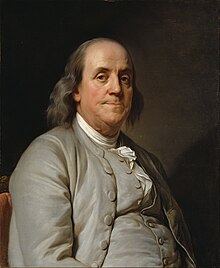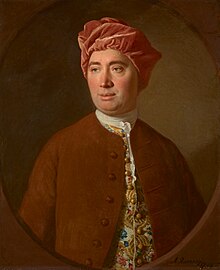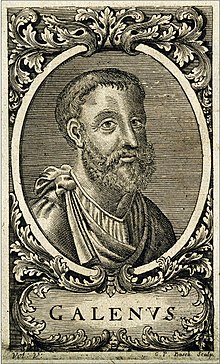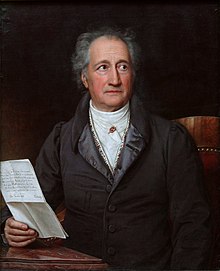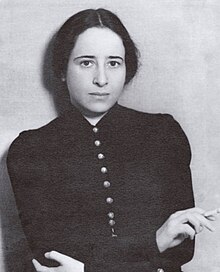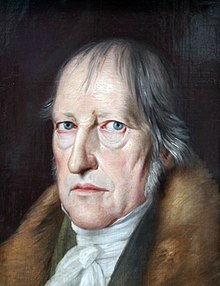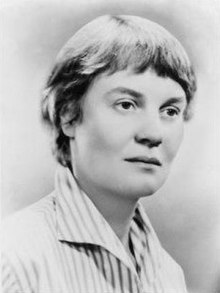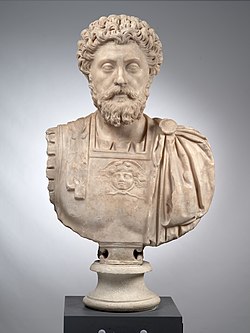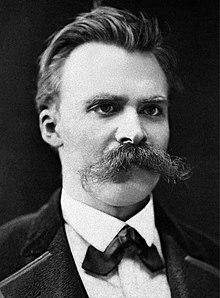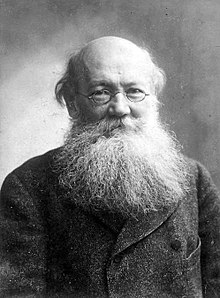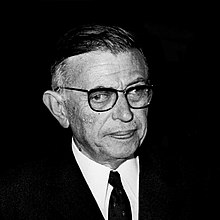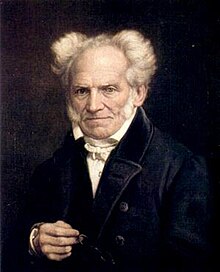
Philosophy writers
Philosophy (from Greek: φιλοσοφία, philosophia, 'love of wisdom') is the systematized study of general and fundamental questions, such as those about existence, reason, knowledge, values, mind, and language. Such questions are often posed as problems to be studied or resolved.
19 episodes
Episodes in this category also belong to the following categories:
Benjamin Franklin
Melvyn Bragg and his guests discuss the life and work of the scientist, writer, printer, diplomat and American founding father Benjamin Franklin.
1 March 2012
Featuring: Simon Middleton, Simon Newman, Patricia Fara
CultureMasonic grand mastersFellows of the Royal SocietyHonorary members of the Saint Petersburg Academy of SciencesIndependent scholarsAmerican male non-fiction writersTheorists on Western civilizationPhilosophers of literatureAmerican deistsAge of EnlightenmentSocial philosophersPhilosophy writersPhilosophers of technologyAmerican political philosophersActivists for African-American civil rightsWriters about religion and sciencePolitical activists from PennsylvaniaAphoristsRecipients of the Copley MedalRhetoric theoristsFellows of the American Academy of Arts and Sciences18th-century pseudonymous writersAmerican people of English descentAmerican philosophers of cultureHumor researchersAmerican male journalistsRecreational cryptographers, Writers from Boston, Writers from PhiladelphiaHall of Fame for Great Americans inducteesAmerican philosophers of religion18th-century American politicians, American Freemasons, Signers of the United States ConstitutionPhilosophers from MassachusettsMembers of the American Philosophical SocietyPeople associated with electricityCreators of writing systemsWriters about activism and social changePhilosophers of scienceAmerican slave ownersPhilosophers of historyAmerican autobiographers18th-century American writers, Founding Fathers of the United States, People of the American EnlightenmentSimple living advocatesIndependent scientistsAmerican philosophers of educationDavid Hume
Melvyn Bragg and his guests discuss the work of David Hume, the philosopher and leading figure of the Scottish Enlightenment.
6 October 2011
Featuring: Peter Millican, Helen Beebee, James Harris
PhilosophyCriticism of rationalismEpistemologistsAction theorists18th-century British essayistsMetaphilosophersSkeptic philosophersPhilosophers of social scienceTheorists on Western civilizationPhilosophers of logicSecular humanistsSocial philosophersPhilosophy writersPhilosophers of economicsWriters about religion and sciencePhilosophers of identityBritish philosophers of educationVirtue ethicistsBritish male non-fiction writers18th-century British philosophersPhilosophers of psychologyPhilosophers of artCritics of the Catholic ChurchBritish critics of religionsPhilosophers of mathematicsAlumni of the University of EdinburghConservatismEmpiricistsOntologistsPhilosophers of mindDeist philosophersPeople of the Scottish EnlightenmentPhilosophers of religionFreethought writersBritish consciousness researchers and theoristsEnlightenment philosophersWriters about activism and social changePhilosophers of sciencePhilosophers of historyBritish male essayistsGalen
Melvyn Bragg and guests discuss Roman physician and medical theorist Galen.
10 October 2013
Featuring: Vivian Nutton, Helen King, Caroline Petit
Goethe
Melvyn Bragg discusses the great German polymath Johann Wolfgang Goethe - novelist, dramatist, poet, humanist, scientist and philosopher.
6 April 2006
Featuring: Tim Blanning, Sarah Colvin, W. Daniel Wilson
Philosophers of linguisticsGerman philosophers of artRomantic poetsGerman philosophers of scienceGerman political philosophersJohann Wolfgang von Goethe, Sturm und Drang18th-century German civil servants, 18th-century German dramatists and playwrights, 18th-century German historians, 18th-century German novelists, 18th-century German poets, 18th-century travel writers, 19th-century German civil servants, 19th-century German diplomats, 19th-century German dramatists and playwrights, 19th-century German poets, German bibliophiles, German diplomats, German male novelists, People from Weimar, Scientists from Weimar, Writers from Frankfurt, Writers from WeimarLiteracy and society theoristsPhilosophers of social science19th-century German philosophersTheorists on Western civilizationGerman travel writersPhilosophers of literaturePhilosophers of sexualityEpic poets19th-century German novelistsPhilosophy writersLeipzig University alumni18th-century German male writersEpigrammatists18th-century German philosophers, 18th-century essayists19th-century travel writers19th-century German male writersUniversity of Strasbourg alumniGerman philosophers of languageMembers of the Göttingen Academy of Sciences and HumanitiesLiterary theoristsMembers of the Bavarian Academy of SciencesFabulistsGerman untitled nobilityGerman philosophers of culture19th-century German essayistsGerman male essayists18th-century German educators, 18th-century historians, 19th-century German educators, 19th-century historiansGerman autobiographersGerman ethicists, German philosophers of educationNatural philosophersGerman male dramatists and playwrights, German male poetsPantheistsFreethought writersEnlightenment philosophersGerman librariansWriters about activism and social changeColor scientistsGerman Freemasons19th-century German historians19th-century German non-fiction writersGerman philosophers of historyGerman male non-fiction writersGoethe and the Science of the Enlightenment
Melvyn Bragg assesses the scientific legacy of the 18th century German poet and thinker Goethe, who gave us the term morphology and is sometimes even credited with inventing biology itself.
10 February 2000
Featuring: Nicholas Boyle, Simon Schaffer
SciencePhilosophers of linguisticsGerman philosophers of artRomantic poetsGerman philosophers of scienceGerman political philosophersJohann Wolfgang von Goethe, Sturm und Drang18th-century German civil servants, 18th-century German dramatists and playwrights, 18th-century German historians, 18th-century German novelists, 18th-century German poets, 18th-century travel writers, 19th-century German civil servants, 19th-century German diplomats, 19th-century German dramatists and playwrights, 19th-century German poets, German bibliophiles, German diplomats, German male novelists, People from Weimar, Scientists from Weimar, Writers from Frankfurt, Writers from WeimarLiteracy and society theoristsPhilosophers of social science19th-century German philosophersTheorists on Western civilizationGerman travel writersPhilosophers of literaturePhilosophers of sexualityEpic poets19th-century German novelistsPhilosophy writersLeipzig University alumni18th-century German male writersEpigrammatists18th-century German philosophers, 18th-century essayists19th-century travel writers19th-century German male writersUniversity of Strasbourg alumniGerman philosophers of languageMembers of the Göttingen Academy of Sciences and HumanitiesLiterary theoristsMembers of the Bavarian Academy of SciencesFabulistsGerman untitled nobilityGerman philosophers of culture19th-century German essayistsGerman male essayists18th-century German educators, 18th-century historians, 19th-century German educators, 19th-century historiansGerman autobiographersGerman ethicists, German philosophers of educationNatural philosophersGerman male dramatists and playwrights, German male poetsPantheistsFreethought writersEnlightenment philosophersGerman librariansWriters about activism and social changeColor scientistsGerman Freemasons19th-century German historians19th-century German non-fiction writersGerman philosophers of historyGerman male non-fiction writersHannah Arendt
Melvyn Bragg and guests discuss the ideas of Hannah Arendt who examined totalitarianism and politics and, when covering the Eichmann trial, explored 'the banality of evil'.
2 February 2017
Featuring: Lyndsey Stonebridge, Frisbee Sheffield, Robert Eaglestone
PhilosophyPrinceton University facultyGerman political philosophersExistentialists20th-century American women writersIntellectual historians, University of Chicago facultyUniversity of Marburg alumniJewish existentialistsWomen religious writersPhilosophers of lawMembers of the American Academy of Arts and LettersSocial philosophersPhilosophy writersPhilosophers of technologyAmerican political philosophers20th-century German women writersGerman women philosophersFellows of the American Academy of Arts and SciencesPhilosophers of cultureThe New School faculty20th-century American essayistsExilliteratur writersJewish agnosticsGerman agnosticsGerman Ashkenazi JewsAmerican Ashkenazi Jews, American Zionists, American agnostics, German Zionists20th-century German philosophers20th-century American philosophers20th-century German non-fiction writersGerman ethicists, German philosophers of educationHeidelberg University alumniPolitical philosophersJewish emigrants from Nazi Germany to the United StatesPhilosophers of scienceScholars of antisemitismPhilosophers of historyAmerican philosophers of educationHegel's Philosophy of History
Melvyn Bragg and guests discuss Hegel's ideas on history as the progress of the consciousness of freedom, and whether we enjoy more freedom now than those in past centuries.
26 May 2022
Featuring: Sally Sedgwick, Robert Stern, Stephen Houlgate
PhilosophyGerman philosophers of artGerman political philosophersUniversity of Tübingen alumniGerman LutheransTheoretical historians19th-century German philosophers19th-century mysticsGerman idealistsPhilosophers of law18th-century German writersDeaths from choleraPhilosophy writers18th-century German male writersGerman philosophers of mind, German philosophers of religionWriters about religion and scienceAcademic staff of the Humboldt University of Berlin18th-century German philosophers, 18th-century essayists19th-century German male writersGerman philosophers of language19th-century German essayistsBurials at the Dorotheenstadt CemeteryGerman male essayists18th-century German educators, 18th-century historians, 19th-century German educators, 19th-century historiansMetaphysiciansHeidelberg University alumniPantheistsEnlightenment philosophersGerman philosophers of historyGerman male non-fiction writersIris Murdoch
Melvyn Bragg and guests discuss the growing prominence of the philosophy of one of the most celebrated novelists of the 20th century, who developed her ideas in response to WWII.
21 October 2021
Featuring: Anil Gomes, Anne Rowe, Miles Leeson
Culture20th-century atheistsBritish people of Irish descentAlumni of Newnham College, CambridgeBritish socialistsBritish ethicistsPhilosophers of literatureJames Tait Black Memorial Prize recipientsAnalytic philosophersPhilosophy writersPlatonistsVirtue ethicistsFellows of the American Academy of Arts and SciencesBritish parodistsPhilosophers of cultureAlumni of Somerville College, OxfordBritish women philosophersBritish historians of philosophyBritish atheists20th-century British philosophersAtheist philosophersPhilosophers of history20th-century British non-fiction writersKant's Copernican Revolution
Melvyn Bragg and guests discuss Kant's ideas on how the world depends on us, on the limits of human knowledge and why we are bound to ask questions we cannot answer.
3 June 2021
Featuring: Fiona Hughes, Anil Gomes, John Callanan
PhilosophyGerman philosophers of artNatural law ethicistsGerman philosophers of scienceGerman political philosophersMetaphilosophersPhilosophers of social sciencePhilosophers of warGerman Lutherans18th-century philosophersTheoretical historiansGerman nationalists19th-century German philosophersTheorists on Western civilizationPhilosophers of literatureGerman idealistsAge of EnlightenmentPhilosophers of logicLogiciansPhilosophers of lawPhilosophers of sexuality18th-century German writersPhilosophy writersRationalists18th-century German male writersKantianismGerman philosophers of mind, German philosophers of religionWriters about religion and science18th-century German philosophers, 18th-century essayists19th-century German male writers19th-century Prussian peopleHumor researchersGerman philosophers of culture19th-century German essayistsPeople of the Age of EnlightenmentGerman agnosticsGerman male essayistsOntologistsGerman ethicists, German philosophers of educationLecturersMembers of the Prussian Academy of SciencesIdealistsNatural philosophersEnlightenment philosophersGerman epistemologistsWriters about activism and social change19th-century German non-fiction writersGerman philosophers of historyGerman male non-fiction writersGerman logicians, Kantian philosophersKierkegaard
Melvyn Bragg and guests discuss the rich and radical ideas of Soren Kierkegaard, often called the father of Existentialism.
20 March 2008
Featuring: Jonathan Rée, Clare Carlisle, John Lippitt
PhilosophyEpistemologists19th-century essayistsChristian humanistsUniversity of Copenhagen alumniMetaphilosophersExistentialistsPhilosophers of deathPhilosophers of literatureExistentialist theologians19th-century male writersChristian poetsSocial philosophersPhilosophy writersAphoristsChristian ethicistsIrony theoristsPhilosophers of culturePeople celebrated in the Lutheran liturgical calendarPhilosophers of psychologyPhilosophers of artChristian radicalsOntologistsPhilosophers of lovePhilosophers of mindMetaphysicians19th-century pseudonymous writers19th-century deaths from tuberculosisPhilosophers of religionMarcus Aurelius
Melvyn Bragg and guests discuss the life, meditations and reputation of this stoic and philosopher king, who Machiavelli called the last of the 'Five Good Emperors'.
25 February 2021
Featuring: Simon Goldhill, Angie Hobbs, Catharine Edwards
Mill
Melvyn Bragg discusses the 19th century political philosopher John Stuart Mill and his treatise On Liberty which is one of the sacred texts of liberalism.
18 May 2006
Featuring: A. C. Grayling, Janet Radcliffe Richards, Alan Ryan
PhilosophyBritish political philosophersHonorary Fellows of the Royal Society of EdinburghEnglish libertariansBritish philosophers of languageConsequentialistsInfectious disease deaths in FranceEnglish socialistsUtilitariansEnglish suffragistsTheorists on Western civilizationBritish ethicistsBritish socialistsEnglish political writersLogiciansEnglish feminist writers, English feministsBritish free speech activistsPhilosophers of sexualityPhilosophy writersBritish classical liberal economistsPhilosophers of economicsBritish social liberals19th-century English non-fiction writersFellows of the American Academy of Arts and SciencesPhilosophers of cultureRectors of the University of St AndrewsPhilosophers of psychologyBritish philosophers of mindEnglish logicians19th-century English philosophersBritish philosophers of logicEnglish autobiographersAnglo-ScotsUK MPs 1865–1868Empiricists19th-century English writersVoting theoristsEuropean democratic socialistsEnglish essayistsEnglish political philosophers19th-century English essayistsEnglish male non-fiction writersEnglish non-fiction writersPhilosophers of scienceEnglish people of Scottish descentPhilosophers of historyEnglish republicansScholars of feminist philosophyEnglish agnosticsBritish male essayistsNietzsche's Genealogy of Morality
Melvyn Bragg and guests discuss Nietzsche's influential ideas about what it means to be moral.
12 January 2017
Featuring: Stephen Mulhall, Fiona Hughes, Keith Ansell-Pearson
PhilosophyGerman philosophers of artDeaths from pneumonia in GermanyPhilosophers of nihilismMetaphilosophersExistentialistsPhilosophers of social science19th-century German philosophersTheorists on Western civilizationStateless peoplePhilosophers of literatureDeterministsPhilosophers of sexualityCritics of work and the work ethic19th-century German novelistsPhilosophy writersCritical theoristsLeipzig University alumniGerman philosophers of mind, German philosophers of religionWriters about religion and science19th-century German male writersAphoristsIrony theorists19th-century Prussian peopleUniversity of Bonn alumni19th-century German journalistsPhilosophers of psychologyGerman critics of ChristianityCritics of the Catholic Church19th-century German male musiciansAnti-consumeristsGerman philosophers of culturePhilosophers of timeCritics of religionsGerman male essayistsPeople associated with the University of BaselOntologistsMetaphysiciansGerman ethicists, German philosophers of educationAnti-nationalistsGerman epistemologistsPeople from the Province of SaxonyWriters about activism and social changeGerman military personnel of the Franco-Prussian War19th-century German non-fiction writersGerman philosophers of historyGerman male non-fiction writersGerman music criticsPeter Kropotkin
Melvyn Bragg and guests discuss the life and ideas of the Russian prince who became an anarchist and who argued that mutual aid was the key to evolution not survival of the fittest
24 February 2022
Featuring: Ruth Kinna, Lee Dugatkin, Simon Dixon
History19th-century essayistsRussian anarchistsRussian atheists19th-century philosophers from the Russian Empire, 20th-century Russian philosophers, Emigrants from the Russian Empire to Switzerland, Emigrants from the Russian Empire to the United Kingdom, Russian communists, Russian revolutionaries20th-century atheistsHuman geographers20th-century essayistsSocial philosophersPhilosophy writersAnti-consumeristsHistorians of the French RevolutionAnarchist writersBurials at Novodevichy Cemetery19th-century non-fiction writers from the Russian Empire19th-century atheistsMembers of the International Workingmen's AssociationPhilippa Foot
Melvyn Bragg and guests discuss one of the most notable philosophers of the 20th century, who explored why it mattered to be moral and why humans needed virtues to flourish.
16 May 2024
Featuring: Anil Gomes, Sophie Grace Chappell, Rachael Wiseman
PhilosophyUniversity of California, Los Angeles facultyEnglish atheistsFellows of the British AcademyVirtue ethicists20th-century English philosophersAlumni of Somerville College, OxfordAnalytic philosophersPhilosophy writersAristotelian philosophersFellows of Somerville College, OxfordEnglish women philosophersBritish atheistsAtheist philosophersPhilosophers of loveMoral realistsWittgensteinian philosophersSartre
Melvyn Bragg discusses the life and works of French novelist, playwright and philosopher Jean-Paul Sartre.
7 October 2004
Featuring: Jonathan Rée, Benedict O'Donohoe, Christina Howells
PhilosophyLycée Henri-IV alumni20th-century atheistsNobel laureates in LiteratureFrench sociologistsBlind writersFrench communistsFrench philosophers of artPhilosophers of nihilismFrench biographers, French ethicistsExistentialistsPhilosophers of social scienceFrench philosophers of sciencePhilosophers of deathÉcole Normale Supérieure alumniTheorists on Western civilizationPhilosophers of literatureContinental philosophersPhilosophers of sexualityPhenomenologistsFree love advocatesFrench atheistsPhilosophy writersCritical theoristsBurials at Montparnasse CemeteryFrench Nobel laureates20th-century French novelistsFrench humanistsLegion of Honour refusals20th-century French dramatists and playwrightsFrench magazine foundersFrench anarchists, French anti-capitalists, French anti-fascistsFrench philosophers of historyAphoristsFrench philosophers of educationFrench political philosophersFrench epistemologistsFellows of the American Academy of Arts and SciencesLycée Louis-le-Grand alumniFrench Marxists, French anti-war activistsFrench literary criticsLibertarian socialistsFrench philosophers of cultureFrench Resistance membersAtheist philosophersFrench scientists with disabilitiesOntologistsPhilosophers of mindMetaphysicians20th-century French philosophersWriters from ParisFrench socialistsScholars of antisemitismSchopenhauer
Melvyn Bragg and guests discuss the pessimistic philosophy of Arthur Schopenhauer and his extraordinary influence.
29 October 2009
Featuring: A. C. Grayling, Beatrice Han-Pile, Christopher Janaway
PhilosophyGerman philosophers of artGerman philosophers of scienceGerman political philosophers19th-century German writersMetaphilosophersGerman eugenicists19th-century German philosophersTheorists on Western civilizationSimple living advocatesPhilosophers of literatureGerman idealistsPhilosophers of logicLogiciansPhenomenologistsPhilosophy writersCritical theoristsGerman philosophers of mind, German philosophers of religionAcademic staff of the Humboldt University of Berlin19th-century German male writersAphoristsGerman philosophers of languagePhilosophers of psychologyUniversity of Göttingen alumniGerman critics of ChristianityGerman philologistsGerman philosophers of culture19th-century German essayists19th-century atheistsCritics of religionsAtheist philosophersGerman male essayistsCritics of JudaismOntologistsPhilosophers of loveGerman writers on atheismGerman ethicists, German philosophers of educationGerman monarchistsPhilosophers of pessimismGerman epistemologistsAnti-natalistsGerman philosophers of historyGerman male non-fiction writersGerman logicians, Kantian philosophersSpinoza
Melvyn Bragg discusses the philosopher Spinoza whose profound and complex ideas about God had him celebrated as an atheist in the 18th century.
3 May 2007
Featuring: Jonathan Rée, Sarah Hutton, John Cottingham
PhilosophyEpistemologistsMetaphilosophersDeterministsAge of EnlightenmentSocial philosophersPhilosophy writersRationalistsPhilosophers of culturePhilosophers of education17th-century writers in LatinCritics of the Catholic ChurchPeople of the Age of EnlightenmentCritics of JudaismOntologistsPhilosophers of mindMetaphysiciansJewish philosophersJewish translators of the BiblePhilosophers of religionPantheistsEnlightenment philosophersBaruch SpinozaPhilosophers of sciencePhilosophers of historyWittgenstein
Melvyn Bragg discusses how Ludwig Wittgenstein, one of the greatest philosophers of the modern age has influenced contemporary culture with his ideas on language.
4 December 2003
Featuring: Ray Monk, Barry Smith, Marie McGinn
PhilosophyEpistemologistsCambridge University Moral Sciences ClubMetaphilosophersPhilosophers of social scienceTheorists on Western civilizationWittgensteinian philosophersPhilosophers of logicAnalytic philosophersPeople with post-traumatic stress disorderBisexual male writersSocial philosophersPhilosophy writersOrdinary language philosophyFellows of Trinity College, CambridgePhilosophers of culturePhilosophers of languageLGBTQ mathematicians, LGBTQ philosophersPhilosophers of artBertrand Russell Professors of PhilosophyPhilosophers of mathematicsJewish agnostics20th-century British philosophersAlumni of Trinity College, CambridgeLinguistic turnOntologistsPhilosophers of mindAustrian people of Jewish descent, Austro-Hungarian military personnel of World War I20th-century Austrian philosophers, Austrian agnostics, Austrian essayists, Austrian logicians, British agnostics, British logicians, British people of Austrian-Jewish descent, Naturalised citizens of the United Kingdom, Writers from ViennaMetaphysiciansJewish philosophersBisexual military personnel20th-century British essayists20th-century British non-fiction writersBritish male essayists
